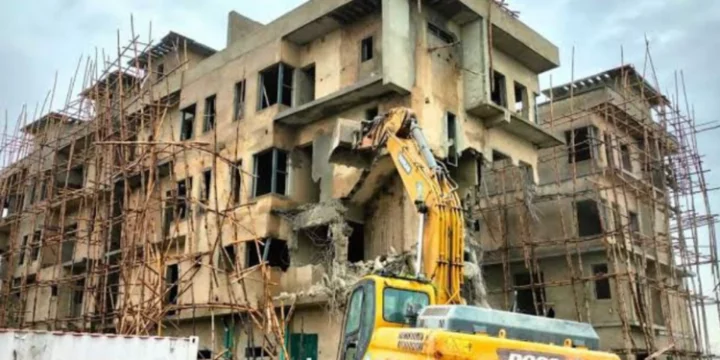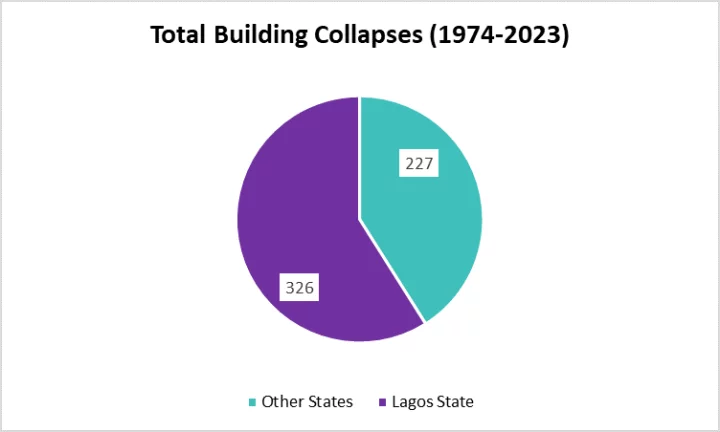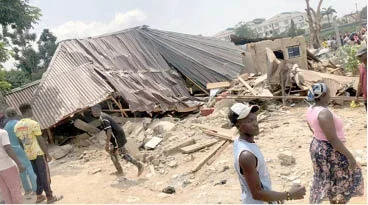
One of the most devastating occurrences in the real estate industry is the issue of building collapse.
These occurrences do not only imply a significant loss of investment but, more importantly, often lead to the loss of lives and leave many families in grief.
According to the Building Collapse Prevention Guide, Nigeria has documented a total of 553 building collapses between 1974 and April 13, 2023.
Of this figure, Lagos State accounted for the highest number, with over 326 collapsed buildings. This represents approximately 58.95% of the total cases recorded nationwide.
Lagos State has unfortunately gained notoriety for this persistent issue of building collapses. Areas such as Ikoyi and Ago Palace have been particularly affected by these occurrences.

In response to this urgent crisis within the state, the Lagos State government has taken proactive measures to address the problem. One of such measures involves the demolition of buildings. Last year, the Federal Housing Authority and the Lagos State Building Control Agency demolished over 600 houses and partially demolished about 700 others on 6th Avenue in Festac Town. Just recently, the Lagos State Government announced its intention to demolish unapproved buildings within the state. This action will be done by the Lagos State Building Control Agency (LASBCA) after the 90-day amnesty period granted expires.
These constant rises in building demolitions across the state can disrupt the real estate market, leading to uncertainty and potential decreases in property values in affected areas.
And for buyers in the market, it poses several risks such as financial loss.
Therefore, to mitigate these risks, we have outlined the 8 things you should do to prevent demolition of your property.
Reasons government demolishes properties
Some of the reasons the government demolishes buildings are:
Structural dilapidation: Buildings may be demolished if they are deemed structurally unsound, posing a danger to occupants and neighboring structures.
Building Code Violations: Structures that violate building codes, such as improper construction materials or illegal modifications, may face demolition.
Illegal Constructions: Buildings constructed without proper permits or approvals from regulatory authorities are subject to demolition to uphold urban planning regulations. In 2023, the government demolished properties in Lekki, Ogudu GRA, Surulere, Ikeja, Ikoyi, Amuwo Odofin, and some other places that have breached the State's physical planning law, failed to get approval from the relevant authorities and that encroached on the right of way. The government also demolished properties on drainages
Unsafe Conditions: Buildings with hazardous conditions, such as fire hazards, electrical faults, or compromised foundations, may be demolished to guarantee public safety.
Public Infrastructure Projects: Demolition may occur to make way for public infrastructure projects like roads, bridges, or utilities.
Environmental Reasons: Buildings situated in environmentally vulnerable areas, such as floodplains or erosion-prone zones, may undergo demolition to mitigate environmental risks. An essential step in this process is conducting an Environmental Impact Assessment (EIA).
An EIA serves to identify and evaluate the potential environmental, social, and health impacts of a proposed project. It also involves assessing alternatives and designing appropriate environmental and social management plans throughout the project's lifecycle.
Urban Renewal: Demolition could be part of urban renewal initiatives aimed at revitalizing blighted areas or upgrading outdated infrastructure.
Public Health Concerns: Buildings infested with pests, mould, or other health hazards may be demolished to prevent the spread of diseases and improve public health.
Abandonment and Neglect: Abandoned buildings that become havens for criminal activities or pose risks of collapse due to neglect may be demolished to restore safety and security.
Land Use Changes: Demolition may occur due to changes in land use policies or redevelopment plans, where existing structures no longer align with future development goals.
8 things you should do to prevent demolition of your property
1.) Ensure Legal Compliance
To protect your property, you should ensure that your property complies with all relevant building codes, zoning regulations, and property laws in Lagos is crucial. To ensure legal compliance for your property, follow these steps:
Conduct thorough research on your property to understand its legal status and obligations.
Consult with legal experts to clarify specific requirements applicable to your property, such as building codes and zoning regulations.
Obtain all necessary permits and approvals from the appropriate government agencies before initiating any construction, renovation, or maintenance work.
For properties in Lagos, agencies like the Lagos State Physical Planning Permit Authority (LASPPPA) oversee urban planning policies and programs, including city plan preparation and development scheme evaluation.
LASPPPA also manages development approval and monitoring, electronic documents, Geographic Information System (GIS) data, site selection for government agencies, supervision of related agencies, and inter-agency coordination
2.) Inspection of the property
Before purchasing a property, it's crucial to conduct thorough inspections to ensure its structural integrity. Among the essential tests mandated by the Lagos State Government is the structural test, which evaluates a building's strength from its foundation to completion.
Conducting inspections before purchasing a property is vital to identify and rectify any structural issues, safety concerns, or violations of building regulations.
Therefore, it's imperative to engage qualified professionals, such as structural engineers or building inspectors, to perform comprehensive assessments of the property's condition.
3.) Document your property ownership
Documenting your ownership of the property with clear and legal documentation is fundamental to protecting your rights as a property owner.
Ensure that you have a credible Certificate of Occupancy (C of O) purchase receipt or deed of assignment. A land surveyor should also be contacted to provide survey plans on the property. The survey plan is a detailed inspection of a property's boundaries and topography. It involves precise measurements to determine the exact size, shape, and relative location of a property.
The copies of these documents should be kept in a secure and easily accessible location, in case of any legal dispute.
4.) Avoid buying properties on illegal land
Avoid buying lands near canals, pipelines, high-tension wires, and close to the main roads.
Properties situated near canals, pipelines, or high-tension wires pose various risks. Canals may be prone to flooding during heavy rains, leading to water damage and potential safety hazards.
Pipelines can pose environmental and safety risks, and properties near high-tension wires may experience health concerns and reduced property value due to electromagnetic fields.
5.) Carry out all legal process
Before, during, and after buying a property, several legal processes must be carried out to ensure a smooth and legally compliant transaction. Before purchasing, it's essential to conduct a title search, land survey, due diligence, and assess environmental risks.
During the buying process, ensure a comprehensive sales agreement, verify payments, and engage legal representation. After buying, complete the transfer of ownership, register the property, ensure tax compliance, obtain insurance, and fulfil maintenance obligations according to local regulations. These steps are crucial to protect your investment and prevent potential legal issues or property demolition in the future.
6.) Buy properties from trusted professionals and companies
Buying properties from trusted professionals and companies, such as Buyletlive, offers peace of mind. These reputable companies not only guide buyers through the purchasing process but also ensure compliance with legal and regulatory standards.
By engaging with trusted professionals, you can reduce the risk of investing in properties that are prone to demolition. These experts conduct thorough due diligence, verifying ownership documents, performing property inspections, and ensuring adherence to building codes and regulations
7.) Stay informed
Staying informed about local developments, infrastructure projects, and government initiatives that may impact your property is critical for proactive risk management.
Ensure you keep yourself educated on the changes in zoning regulations, urban development plans, and land use policies that could affect your property rights or value.
Keep yourself updated on the policies or regulations made by the government. And engage with relevant government agencies to stay informed about potential risks and opportunities.
8.) Know your rights
Familiarizing yourself with your rights as a property owner under Lagos state laws and regulations is crucial for protecting your property from demolition threats.
Educate yourself about due process requirements, legal procedures necessary to be taken, in the event of disputes or enforcement actions.
Conclusion
The alarming frequency of building collapses in Lagos State emphasizes the urgent necessity for proactive measures to protect properties. The Lagos State Government's decisive actions, including building demolitions for non-compliant structures, reflect a concerted effort to address this pressing issue.
As such, it is imperative for investors in the real estate market to take proactive steps to protect their properties from potential demolition.
















Comments